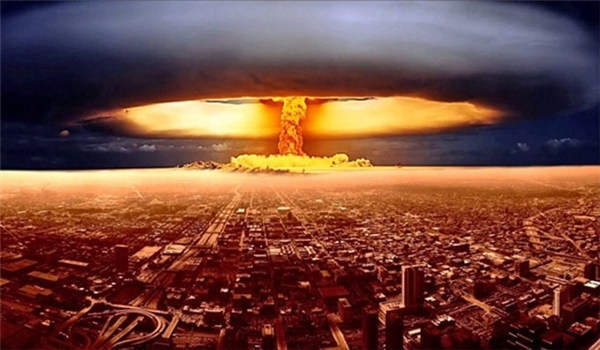
RNA - There is still a lot to say about this day, when 72 years ago, the United States became the first and only nation to use nuclear weapons. So much is said every day about nuclear weapons and threats from nuclear-armed states, but that one historic fact remains among all the blather. For all the talk, only America has dropped the bomb.
America did it twice (the Nagasaki bomb was on August 9) and America did it on two civilian targets. There is no use arguing that the two cities had significant military value; if there had been, they would have already been firebombed to tinder the way Tokyo and other cities in Japan had been. Civilians were not, in today’s language, collateral damage. They were the targets. And no, as some American officials still would like to suggest, the Japs didn’t deserve it:
On August 9, 1945, President Harry Truman delivered a radio address from the White House: “The world will note that the first atomic bomb was dropped on Hiroshima, a military base. That was because we wished in this first attack to avoid, insofar as possible, the killing of civilians.” He did not mention that a second atomic bomb had already been dropped on Nagasaki.
The two cities had not already been firebombed and largely obliterated by American air power. US officials used the first atomic bombs to create maximum terror and destruction. They also wanted to measure their new weapon’s power and so selected the “virgin targets” of Hiroshima and Nagasaki.
Some 72 years later, the United States seems farther than ever from a rejection of the idea that launching the atomic warfare on Japanese civilian populations was “an act of mercy.” The US further refuses to apologize for the nuclear obliteration of the two cities. After all, the US possesses tens of thousands of “Little Boys” and “Fat Mans” and might decide to drop them somewhere.
It turns out, the US hasn’t come even one step closer to a moral reckoning with its status as the world's only country to have used atomic weapons to slaughter human beings. And the US hasn’t come to grips with the “black rain” that spread radiation and killed even more people, leading in the end to a death toll estimated at more than 250,000. Lest we forget President Truman’s radio address after the attacks: “Never, never waste a minute on regret. It’s a waste of time.”
As long as this is still the official mindset in Washington, a world without weapons of mass destruction will remain elusive. The US refuses to fulfill its Article VI obligations to begin good faith negotiations to eliminate its nuclear arsenals. The US also refuses to co-convene the promised Middle East Nuclear Weapons and WMD-Free Zone Conference.
And the US isn’t just whistling Dixie. The country calls on seven other nuclear weapons states (Russia, UK, France, China, India, Pakistan, and North Korea - with the exception of Israel, of course) to disarm, while it continues to modernize its own nuclear arsenal. As a consequence, this planet is still loaded with a world-ending arsenal that is constantly being expanded, updated, and modernized. As long as these inhuman arsenals exist, the risk of their use by miscalculation or madness, technical or human error remains real.
During the Second World War, the US managed to ignore how its leaders ushered the world into the nuclear age by annihilating not one but two cities, killing hundreds of thousands of defenseless civilians. Today, however, the US shouldn’t ignore how the modern versions of these inhuman arsenals could easily plunge the planet into nuclear winter and eradicate humanity for good. President Truman’s radio address is a reminder that “even the Americans will note.”
In sum, the world is overwhelmed by terrorism and war, whilst most of those behind the ongoing conflicts happen to be armed with nuclear weapons, particularly Israel and the United States. With what they have done to the Middle East and North Africa, it is indeed naïve to believe their leaders are far too reasonable to ever actually use nuclear weapons.
No doubt the world has avoided a US-led nuclear war more through luck than through rationality, and sooner or later its luck will run out. This is because the nuclear war plans of other nuclear-armed states are never as conflicted as those of the US, Britain and Israel. The world needs to figure out a way to ban all nukes once and for all. After 72 years, the stakes couldn’t be higher. These inhumane arsenals could only go away if the nuclear-armed states come to realize that they are costly, useless militarily, and unnecessary for deterrence.
847/940